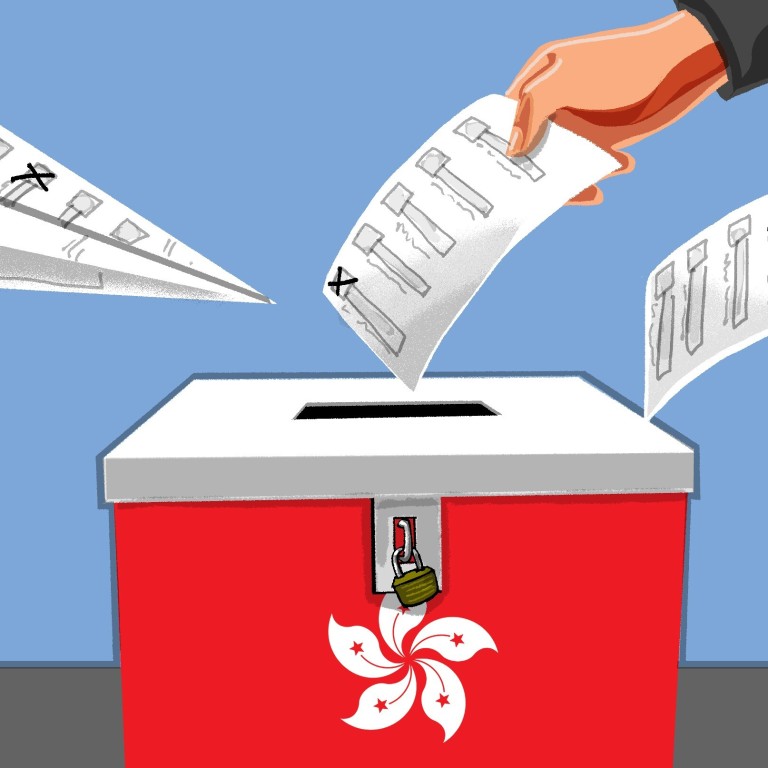
Don’t deny the vote to Hongkongers in mainland China because of overblown concerns about electoral fraud
- Hong Kong’s ICAC, which oversees electoral fraud, has ample experience working with counterparts elsewhere to pursue offenders
- Allowing the millions of Hongkongers living on the mainland to vote is long overdue, and authorities are capable of ensuring the process is ‘fair, open and honest’
The Basic Law could not be clearer. It says that Hong Kong permanent residents “shall have the right to vote”. However, having the right to vote is one thing, exercising it is another, as electors living elsewhere in China know all too well.
Although some people have asked if alternative methods are feasible, including electronic voting and postal ballots, it is wise to take one step at a time. As the mainland affairs bureau has emphasised, the integrity of the vote is the government’s priority, with elections being conducted in a “fair, open and honest manner”.

00:56
Hong Kong leader Carrie Lam to visit Beijing for talks on reviving economy
If implemented, Hong Kong permanent residents living on the mainland would be able to vote at the government’s offices throughout the country. They are in Beijing, Shanghai, Guangzhou, Wuhan and Chengdu, and the polling stations would be located there, with appropriate supervision. To facilitate this, the electoral law would have to be amended, so that the Registration and Electoral Office, which conducts the city’s elections, can also operate on the mainland.
It refers to a place where a person’s lifestyle is centred, and to which the person returns if his or her presence is not continuous. Most Hong Kong people living and working on the mainland make periodic visits to their home city, with very few having severed their links altogether.
Hong Kong residents overseas ask: why can’t we vote from abroad too?
In many places, it is recognised that citizens living elsewhere should not forfeit their right to vote. In the United Kingdom, for example, someone can register to vote as an overseas elector if he or she is a British citizen, and has been registered to vote in the UK within the previous 15 years.
In Canada, someone who is at least 18, lives overseas and has lived in Canada at some point in their life, can apply for inclusion in the International Register of Electors, and then remain on it indefinitely, regardless of how long they live abroad.
Closer to home, Singapore allows its overseas citizens to vote in its elections, at either its embassies or consulates. However, to qualify as an overseas elector, a citizen must have spent at least 30 days in Singapore in a three-year period.
In 2005, the Supreme Court of Japan ruled that it was unconstitutional for the government to use non-residence as a basis for limiting the voting rights of Japanese citizens who were living overseas. In Malaysia, overseas voting has, since 2013, been open to most registered voters living abroad.


Its investigation involved the authorities in Hong Kong, Singapore and the mainland, and two suspects, Cheng Wui-yiu and Cheung Wai-ming, were eventually arrested on the mainland. They were then tried in Hong Kong, on evidence obtained from different jurisdictions, and, after conviction, Cheng received life imprisonment and Cheung 27 years’ imprisonment.
As the ICAC knows exactly how to discharge its mandate elsewhere, the alleged problems have been overblown. Quite clearly, the electoral process, controlled by the Registration and Electoral Office and overseen by the ICAC, can be conducted appropriately.
The government, therefore, is justified in facilitating the rights of electors residing on the mainland, thus correcting an anomaly which is not only discriminatory, but also makes a mockery of the right to vote.
Grenville Cross SC is a criminal justice analyst

